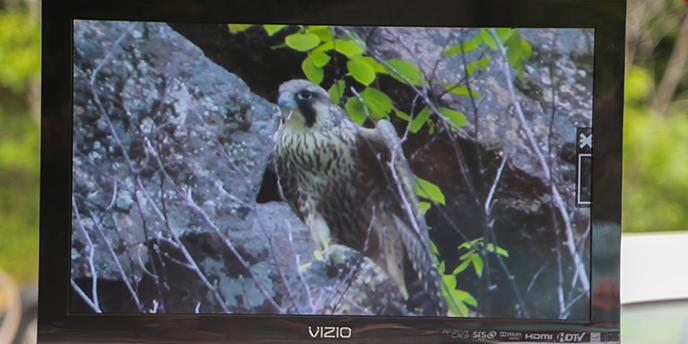|
You are viewing ARCHIVED content published online before January 20, 2025.
Please note that this content is NOT UPDATED, and links may not work. For current information,
visit https://www.nps.gov/aboutus/news/index.htm.

NPS/AYTT
Contact: Bruce Connery, 207-288-8726 Adult peregrine falcons were recently observed defending Jordan Cliffs and the air space in front of it as well as being observed engaged in courtship behavior in the same area. Together these activities suggest that the adult pair of peregrine falcons have claimed the cliffs as their nesting territory for 2015.Adult falcons will often exhibit aggressive behavior toward visitors or staff on a trail or the cliff that is within their nesting territory and is the reason that Acadia National Park's Superintendent, Sheridan Steele, has approved the closing of the cliffs and trail today.The peregrine falcon remains a listed species under Maine's Natural Resource Protection Act (NRPA 38 MRSA 480-B).In order to protect the nesting birds from inadvertent disturbance or harassment, the areas in and around Jordan Cliffs, including the Jordan Cliffs Trail on Penobscot Mountain are now closed to all visitor and operational activities.Trails will remain closed until approximately five weeks after the chicks take their first flights, or fledge, from their nesting site. Park staff anticipates the opening of these closed areas in early August if the nesting attempt is successful. If the park biologist determines that the nesting attempt has failed later this spring or during early summer, the park will cancel the closure and the trails will be opened once they have been determined to be in good condition and safe for hiking. Park staff and volunteers will be conducting observations of Jordan Cliffs along with other park nesting areas such as the Precipice and Valley Cove to document the status of the nesting activities and inform any management actions.Research has shown that nesting falcons are particularly vulnerable to human disturbance originating immediately above the nesting area or directed at the nest site.Continued disturbances can lead to chick mortality or complete nest failure, which further slows the recovery of the species in Maine. The park will announce the reopening of the closed area and trail when the park and the State Endangered Species biologist determine that any fledgling chicks are not dependent on the cliff and are less likely to be disturbed or harmed by human activities.
|
Last updated: April 16, 2015
